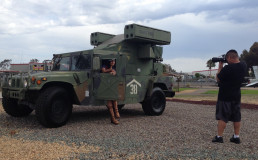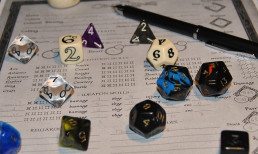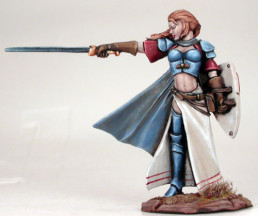Working with Photographers
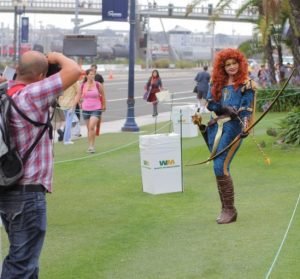 Photographers are an important part of the convention experience for most cosplayers. Whether it is a prearranged photo shoot or a photog wandering the lobby of a convention, it's important that cosplayers realize that the photographers are artists too. There are rules of etiquette that should be followed while working with photographers if you want to get the most out of your shoots.
Photographers are an important part of the convention experience for most cosplayers. Whether it is a prearranged photo shoot or a photog wandering the lobby of a convention, it's important that cosplayers realize that the photographers are artists too. There are rules of etiquette that should be followed while working with photographers if you want to get the most out of your shoots.
Do's:
Label Yourself
Photographers will shoot dozens of cosplayers throughout the day. Unless it's a planned shoot and they know you well, it helps to have a label to remind them of 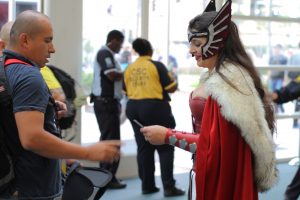 who you are. Asking them to take an extra shot with you holding up your badge or a small sign with your contact info can help them identify you later. Business cards help too, but photographers can have a hard time identifying you when they are sifting through a stack of cards a few days later, especially if your photographed costume does not appear on your card.
who you are. Asking them to take an extra shot with you holding up your badge or a small sign with your contact info can help them identify you later. Business cards help too, but photographers can have a hard time identifying you when they are sifting through a stack of cards a few days later, especially if your photographed costume does not appear on your card.
Know your Character
Photographers cannot be experts in every character that appears at a convention. It's up to you to know your character and have some appropriate poses ready for photographers in the hall and on private shoots. If a private shoot is happening, tell the photographer a little about the character so they can capture the mood correctly. Pro Tip: Never shame a photographer for not knowing your character. Duh.
Be Patient & Relax
Photo shoots take time and a lot of adjustments. The photographer will probably change the settings on their equipment, move around to different angles, and may even ask you to move or adjust your pose. These things do not mean that you are doing a bad job! Most often, they are working to optimize the lighting or the background of a shot. Let them know upfront if you have a strict timeline, but otherwise, be patient while they practice their art. You wouldn't like it if someone sat next to your sewing machine looking annoyed that you weren't going faster!
Have some Ideas Prepared
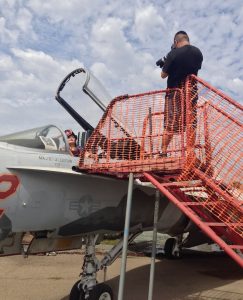 If you've hired or asked for a shoot with a photographer, be sure that you have an idea of what you want from the pictures. Have some locations in mind and schedule it for a time with good lighting. You don't want to waste time wandering around looking for a spot to shoot, or waiting for the light to be right.
If you've hired or asked for a shoot with a photographer, be sure that you have an idea of what you want from the pictures. Have some locations in mind and schedule it for a time with good lighting. You don't want to waste time wandering around looking for a spot to shoot, or waiting for the light to be right.
Communicate
You are the photographer's partner during the photo shoot. Be respectful, but contribute to the process. If there is a side that you don't want them to shoot, if you'd rather they only get full body shots, if your costume is damaged somewhere and you don't want it in the shot, or if you are running late, let the photographer know! Most of them are really amazing people and will do their best to make you happy.
Know your Rights
In most cases, the photographer owns all the images that they take. Unless you hired the photographer and have a contract saying that you own the images, you will need to get the photographer's permission before using the picture for  prints, using the pictures to sell products, or for use by third parties like magazines or TV shows. Most photographers don't care if you put the images on personal blogs or social networks, but you should check with them first. (Read this great article by BGZ Studios for a full breakdown of the laws and how they impact photographers and cosplayers.)
prints, using the pictures to sell products, or for use by third parties like magazines or TV shows. Most photographers don't care if you put the images on personal blogs or social networks, but you should check with them first. (Read this great article by BGZ Studios for a full breakdown of the laws and how they impact photographers and cosplayers.)
Credit the Photographer
No matter where you post or share an image, you should make sure that the photographer is credited with either a watermark on the image or with a caption of some type attached to the picture. There is no excuse for not giving credit to the artist who made the image possible. Be especially careful of this when you share images on Instagram since watermarks sometimes are not able to be fit in the square limit of the pictures! Add a tag and credit in your text!
Don'ts:
Alter Pictures
 The picture is the property of the photographer. Just like you wouldn't want someone repainting your car without asking, it's not right to Photoshop or alter images without the permission of the photographer. This includes cutting out watermarks, changing backgrounds, tweaking the colors, or adding your own watermark. Talk to the photographer before you do any of these things. BEWARE OF INSTAGRAM! The filters and picture proportions there can significantly alter an image.
The picture is the property of the photographer. Just like you wouldn't want someone repainting your car without asking, it's not right to Photoshop or alter images without the permission of the photographer. This includes cutting out watermarks, changing backgrounds, tweaking the colors, or adding your own watermark. Talk to the photographer before you do any of these things. BEWARE OF INSTAGRAM! The filters and picture proportions there can significantly alter an image.
Change a Planned Shoot without Asking
There is a lot of prep work involved in setting up and planning for a photo shoot and changing details without talking to the photographer can really mess up the final product. Changing a location can completely alter the lighting that a photographer sets up and changing your planned outfit or the number of models in a shot can change what lens a photog needs to use. Don't make changes without giving your photographer some notice.
Leave them Hanging
Life happens. Make sure that you have a way to contact your photographer in case something happens and you will be late or miss a shoot. Wasting their time during a busy convention is one of the fastest ways to insure that a photographer will never shoot with you again.
Ask for Raw Photographs
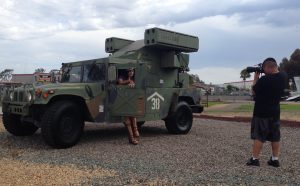 The photographer has made the pictures look a specific way because that was their vision. It is their art and you should respect their vision. Don't ask for the raw pictures so that you can edit them a different way. If you're not a fan of their style, then be polite but don't shoot with that photographer again. Note: This is not the same as asking for larger file sizes for prints, etc.
The photographer has made the pictures look a specific way because that was their vision. It is their art and you should respect their vision. Don't ask for the raw pictures so that you can edit them a different way. If you're not a fan of their style, then be polite but don't shoot with that photographer again. Note: This is not the same as asking for larger file sizes for prints, etc.
Crash a Shoot
A photographer with a nice setup draws cosplayers like moths to a flame. However, it is very rude to interrupt a shoot to see if you can "be next," or to stand right next to the shoot talking loudly or tapping your foot. Move a little way off and wait patiently. When you see the shoot finishing up, politely ask if the photographer has any openings to shoot that day. Be understanding if the answer is no.
Go off Alone with a Stranger
Most convention photographers are totally legitimate professionals and hobbyists, but an impressive camera does not always mean that the person has good intentions. Never go to an off-site or secluded location alone with a photographer that you don't know well. No professional photographer will object to you having friends tag along to make you comfortable and help insure your safety. TRUST YOUR GUT FEELINGS ON THIS! If something feels off or if a photographer is trying hard to get you alone, STAY AWAY!
Do Anything that makes You Uncomfortable
If you feel uncomfortable with the actions or attitude of a photographer, stop the shoot. Pictures are not worth your pride, or the humiliation that might come later if the photographer is taking advantage of the situation. You are partners with the photographer and respect goes both ways.
Thank you to Photographers Sonny Meas, Deborah Kountz, Dwain Linden, Mike Rollerson, Eddric Lee for their input and contributions to this article. Special thanks to Sam Balcomb for the uncredited images in this article, and to Andrew Ho and Cesar Vivid Photography for appearing in those pictures.
Tabletop RPGs: Tips for New Players
"I'd love to play D&D but I don't know how and don't want to mess up the game."
I've heard this statement from many people over the years, many of whom became avid gamers with a little assistance. Playing tabletop RPGs is a lot of fun, but it can also be intimidating for new players. Unlike most board games with a set goal and predicable player experience, RPGs change with every choice that the characters make during the game session.
Not having a "right way" or rails to fall back on can make inexperience players feel unsure and self conscious, but don't let that keep you from joining a game!
Nobody learns to play a tabletop RPG without sitting at a table and actually playing.
You can memorize everything about the game, but becoming a good RPG player takes practice. You will learn as you go, and even after playing for decades you will keep learning from new experiences. Just like the characters we play, we get XP as we go!
It always helps to have some guidance though, and so, I'd like to impart some knowledge that will be helpful to new players.
Who is in charge?
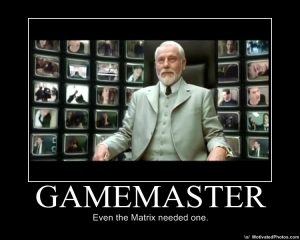 The Game Master (GM), or Dungeon Master (DM) if you are playing D&D, is in charge of running the game. It is their job to make sure that the game is engaging, follows the system's rules, and that everyone is having fun. They are, in many ways, the "god" of your game world. They create the setting, non- player characters, monsters, situations and everything else that you and your fellow players will face in the game.
The Game Master (GM), or Dungeon Master (DM) if you are playing D&D, is in charge of running the game. It is their job to make sure that the game is engaging, follows the system's rules, and that everyone is having fun. They are, in many ways, the "god" of your game world. They create the setting, non- player characters, monsters, situations and everything else that you and your fellow players will face in the game.
It is important to note that the GM does NOT get to make your choices for you.
They can create the dungeon with a dragon inside, but they cannot make your character walk in and slay it. That has to be your choice. If you want your character to head to the local tavern instead, you have that right! (But I can't guarantee the GM won't turn around and make the dragon attack the tavern!)
It's a good idea to befriend your GM. They are the best resource for everything related to your campaign and can help you with any questions you have along the way. Work closely with them as you learn the system and show your appreciation for all the hard work they put in to keeping the game going. You show up and play once a week, but they spend hours prepping before every session. Without the GM, there is no game.
How do I build my character?
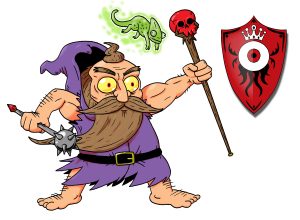 I could write a whole post about creating a character (and I probably will in the future!) but for now, I will try to keep it short and sweet.
I could write a whole post about creating a character (and I probably will in the future!) but for now, I will try to keep it short and sweet.
Talk to your GM before you start making your character and ask for their advice. Different games have different flavors and you don't want your character to bring a gun to a magic fight, or be an evil character in a group of holy paladins. Or maybe you do want that, but you should get permission from your GM before adding that type of complexity to the game.
All systems have a set of mechanics to help you build a character's abilities, so make sure that you read that section of the players handbook thoroughly. If you have questions about the process, your GM and fellow players are your best resource to help you make your character. There are also many online forums where you can ask any questions that you might have during character creation.
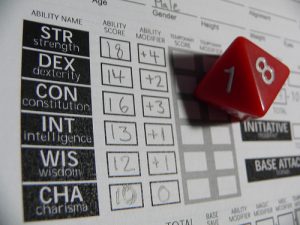 Make sure that your character's stats (strength, intelligence, etc) support the skills and abilities that you select for them. For example, most fighters will need a lot of physical stat points, such as strength and constitution, while magic users or investigation types will need more intellectual stats. It's not helpful to have a fighter who isn't strong enough to wear their armor! Chose your stats and abilities wisely, because they change slowly once the campaign starts!
Make sure that your character's stats (strength, intelligence, etc) support the skills and abilities that you select for them. For example, most fighters will need a lot of physical stat points, such as strength and constitution, while magic users or investigation types will need more intellectual stats. It's not helpful to have a fighter who isn't strong enough to wear their armor! Chose your stats and abilities wisely, because they change slowly once the campaign starts!
Next, develop your character's personality. Hopefully, you had something in mind while you were working on his/her stats and skills. Some game systems have personality stuff built in to character creation which give you a basic framework for a personality and back story. If so, great! Just use that as a basic structure and add in some smaller details. If not, you have a bit more to do to create your character.
What can my character do?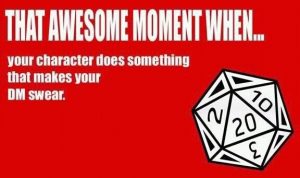
Your character can TRY anything that you'd like, but they won't always succeed. Take chances and think out of the box. Every problem should have multiple solutions. Success is determined by your dice rolls and the GM's choices. Choose wisely! Saying, "I shove a sword up his butt!" may not be as funny as you expect when it actually happens in the game.
Be an active participant!
Tabletop RPG game sessions can last a long time, usually several hours for a single session. The time can sometimes pass slowly, especially during combat, it's important to take an ACTIVE interest in everything that is happening during the game. That means listening and participating in character, maybe even taking notes so that you can remember important details later.
Combat can take time, but it's important that you are paying attention to what other players are doing on their turns!
There is nothing worse than being in the midst of a difficult combat and having a player do something useless because they have no idea what the last player did on their turn. Be aware of what players are doing so that you can make good tactical choices and contribute to the battle!
What is metagaming? Why is it bad?
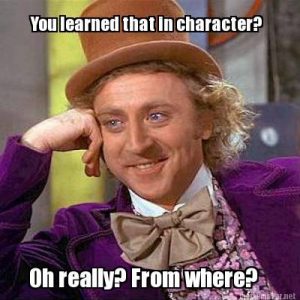 Metagaming is making decisions based upon out of game knowledge. For example, you saw your GM's notes and know that there is a dragon in the dungeon. If you have your character avoid the dungeon, you are metagaming. Your character doesn't know there is a dragon waiting to eat you. You are using PLAYER knowledge to make a choice in game, not CHARACTER knowledge. For obvious reasons, metagaming can really mess up a game. DON'T DO IT!
Metagaming is making decisions based upon out of game knowledge. For example, you saw your GM's notes and know that there is a dragon in the dungeon. If you have your character avoid the dungeon, you are metagaming. Your character doesn't know there is a dragon waiting to eat you. You are using PLAYER knowledge to make a choice in game, not CHARACTER knowledge. For obvious reasons, metagaming can really mess up a game. DON'T DO IT!
Ask Questions!
Nobody expects you to know everything! Asking questions, in character or out of character, is a natural part of the game. Everyone does it, no matter how long they have been playing. Why do you think gamers carry around the game rule books all the time?
Thou Shalt Not Play with Assholes
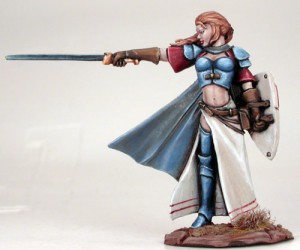 Should subjective tabletop RPG rules be eliminated since they can allow the GM's biases to influence the game?
Should subjective tabletop RPG rules be eliminated since they can allow the GM's biases to influence the game?
This rather hot topic has arisen lately, especially regarding mechanics where the GM can reward players for their role-playing. This discussion was started by site called Gaming for Women and we recently discussed it on an episode of the Happy Jack's RPG podcast.
While misogynistic behavior was the main concern of the article, any time you allow the human element into activities it opens the door for prejudice. I will be the first to admit that this can lead to horrible situations in games and in gaming groups. However, I argue that this subjectivity is imperative to gaming and especially vital with reward mechanics. The human element is the reason we play tabletop games. Otherwise, we'd all just go play video games since they are available whenever we want and don't drink all the beer when they come over. I have seen reward mechanics bring quiet role-players out of their shell and bring games to a whole new level. If a numbers mechanic regulated the use of rewards, rather than the GM, the same people would always get the bennies! Only the subjective judgement of a GM can evaluate the amount of effort a player is putting into the game.
Some people (read: self-proclaimed feminists) chimed in on my twitter feed and claimed that women may need all subjective rules to be eliminated in order to insure total fairness in all gaming groups. WTF? Seriously? I cannot begin to describe how insulted I was by the idea that women need rules to protect them in RPGs. If you are in a group where you need rules to protect you from a GM's vindictive actions, get the fuck out of there! We play games FOR FUN! If you are playing with people who treat you unfairly based on your gender, race, religion, sexual orientation, beer preference, or anything else, it isn't going to be fun. Nobody should ever stay in any type of relationship (romantic, friendly, gaming, or otherwise) where the only thing protecting them from abuse is rules. Being empowered includes the power to remove yourself from a bad situation. Find another group, or start checking out online gaming options if the pickings are slim in your area.
Remember Kimi's golden rule of gaming: thou shalt not play with assholes!
